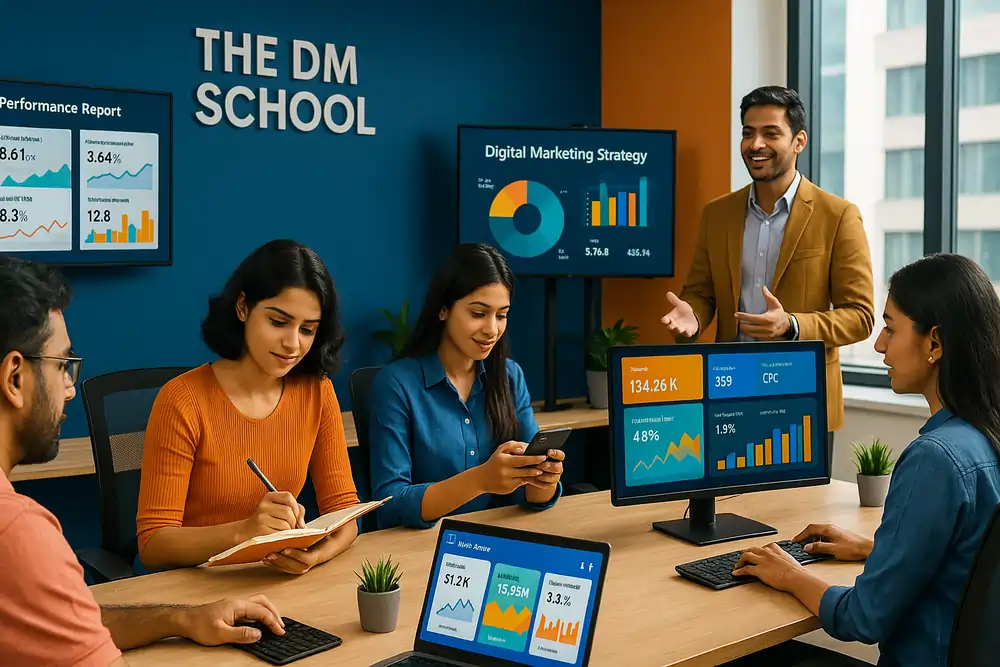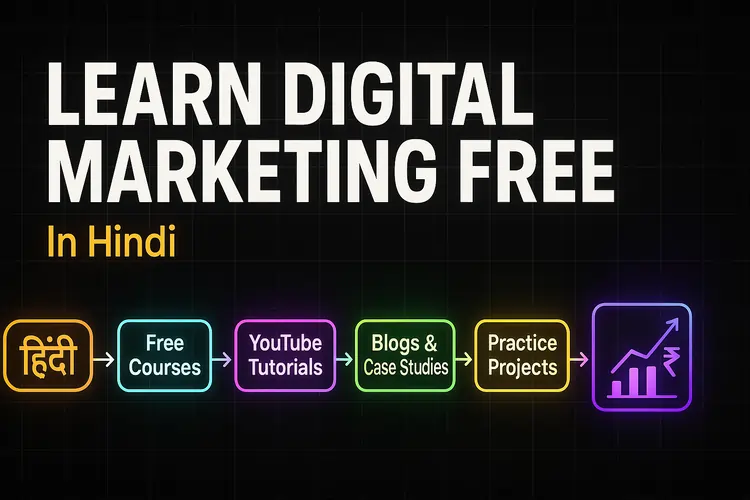Hey there! Ever wondered if digital marketing is a good career in India? Let’s dive right in and explore. This field is booming, and with good reason. Technology and the internet are reshaping how businesses operate. Traditional marketing? It’s taking a back seat. Digital marketing is now the star of the show, opening up loads of opportunities. But is it a solid career choice in India? Let’s find out!
The Growing Demand for Digital Marketing in India
High Demand for Digital Marketing Skills
Digital marketing skills are in hot demand in India. According to LinkedIn, digital marketing is one of the top 10 most sought-after skills. Companies are hunting for skilled digital marketers to help them thrive online. This demand is only set to grow as more businesses go digital.
Industry Growth and Opportunities
The digital marketing industry in India is expanding at lightning speed. With over 700 million internet users, India is one of the biggest online markets globally. This surge is fueled by more internet access, more smartphones, and the rise of digital payments. As businesses tap into this huge online market, they need more digital marketing pros.
Diverse Career Opportunities in Digital Marketing

Various Specializations
Digital marketing is a broad field with numerous specializations. Some of the key areas include:
- Search Engine Optimization (SEO): SEO specialists focus on optimizing websites to rank higher in search engine results. They use techniques like keyword research, on-page optimization, link building, and content creation to improve a site’s visibility. SEO is a critical aspect of digital marketing as it drives organic traffic to websites, which is often the most valuable type of traffic.
- Keyword Research: Identifying the most relevant and high-traffic keywords for a website’s content.
- On-Page Optimization: Optimizing content, meta tags, images, and URLs to make them search engine friendly.
- Link Building: Acquiring high-quality backlinks from reputable websites to improve domain authority.
- Content Creation: Developing engaging and relevant content that attracts and retains website visitors.
- Social Media Marketing (SMM): SMM professionals manage a company’s presence on social media platforms like Facebook, Instagram, Twitter, and LinkedIn. They create content, run ads, and engage with followers to build a community around the brand. Social media marketing helps businesses connect with their audience, increase brand awareness, and drive website traffic.
- Content Creation: Developing posts, images, videos, and stories that resonate with the audience.
- Ad Management: Running targeted ads to reach specific demographics and interests.
- Community Engagement: Interacting with followers through comments, messages, and live sessions.
- Analytics: Tracking metrics like engagement, reach, and conversions to measure campaign effectiveness.
- Content Marketing: Content marketers create and distribute valuable content to attract and retain a clearly defined audience. This includes blog posts, articles, videos, podcasts, infographics, and more. Content marketing aims to provide useful information to the audience, establish the brand as an authority in its field, and drive profitable customer action.
- Blogging: Writing informative and engaging blog posts that address the audience’s needs and interests.
- Video Production: Creating videos that explain concepts, demonstrate products, or share customer testimonials.
- Podcasting: Hosting or participating in podcasts to discuss industry topics and trends.
- Infographics: Designing visual representations of information to make complex data easily understandable.
- Pay-Per-Click (PPC) Advertising: PPC experts manage paid advertising campaigns on platforms like Google Ads and Facebook Ads. They bid on keywords, create compelling ads, and optimize campaigns to maximize ROI. PPC is an essential part of digital marketing as it provides immediate visibility and can drive targeted traffic to websites.
- Keyword Bidding: Selecting and bidding on relevant keywords to display ads in search results.
- Ad Creation: Designing ads that attract clicks and encourage conversions.
- Campaign Optimization: Continuously monitoring and adjusting campaigns to improve performance.
- Performance Tracking: Analyzing metrics like click-through rates (CTR), cost per click (CPC), and conversion rates.
- Email Marketing: Email marketers design and execute email campaigns to nurture leads and build relationships with customers. This involves creating newsletters, promotional emails, and automated email sequences. Email marketing is a highly effective channel for driving conversions and retaining customers.
- Newsletter Creation: Sending regular updates to subscribers with valuable content and company news.
- Promotional Emails: Crafting emails that promote products, services, or special offers.
- Automated Sequences: Setting up email workflows that deliver targeted messages based on user behavior.
- List Management: Segmenting and managing email lists to ensure relevant and personalized communication.
- Analytics: Digital marketing analysts track and analyze data to measure the effectiveness of marketing campaigns. They use tools like Google Analytics, SEMrush, and social media analytics platforms to gather insights and make data-driven decisions. Analytics is crucial for understanding campaign performance, optimizing strategies, and achieving marketing goals.
- Data Collection: Gathering data from various digital marketing channels.
- Performance Analysis: Analyzing metrics like traffic, engagement, conversions, and ROI.
- Reporting: Creating detailed reports that summarize campaign performance and provide actionable insights.
- Strategy Optimization: Using data to refine and improve digital marketing strategies.
Job Roles and Responsibilities

The digital marketing field offers a variety of job roles, each with its unique set of responsibilities. Some common job titles include:
- Digital Marketing Manager: Oversees the overall digital marketing strategy, coordinates with different teams, and ensures that all digital marketing efforts align with the company’s goals. They are responsible for planning, executing, and measuring the effectiveness of digital marketing campaigns. They also manage budgets, analyze performance metrics, and optimize strategies to achieve the best results.
- SEO Specialist: Focuses on optimizing website content and structure to improve search engine rankings and drive organic traffic. They conduct keyword research, implement on-page and off-page optimization techniques, and monitor website performance using tools like Google Analytics and Search Console.
- Content Marketer: Creates engaging and valuable content to attract and retain customers. This includes writing blog posts, creating videos, designing infographics, and producing other types of content that provide value to the audience. Content marketers also work on content distribution and promotion strategies to ensure maximum reach and engagement.
- Social Media Manager: Manages the company’s social media profiles, creates content, runs ads, and engages with followers. They develop social media strategies, monitor trends, and track performance metrics to improve social media presence. Social media managers also handle community management and customer service on social platforms.
- PPC Specialist: Manages pay-per-click advertising campaigns. They conduct keyword research, create ads, and optimize campaigns to maximize ROI. PPC specialists use platforms like Google Ads, Facebook Ads, and LinkedIn Ads to reach the target audience and drive traffic to the website. They also analyze campaign performance and make data-driven adjustments.
- Email Marketing Specialist: Designs and implements email campaigns to nurture leads and maintain customer relationships. They create newsletters, promotional emails, and automated email sequences. Email marketing specialists also segment email lists, track campaign performance, and optimize email strategies to increase open rates and conversions.
- Analytics Expert: Uses data analysis tools to measure the effectiveness of digital marketing campaigns. They track key performance indicators (KPIs), generate reports, and provide insights to optimize strategies. Analytics experts use tools like Google Analytics, SEMrush, and social media analytics platforms to gather and analyze data.
Good Pay and Benefits
Competitive Salaries
Digital marketing offers competitive salaries in India. The average salary for a digital marketing manager is around ₹9 lakhs per annum, with entry-level positions starting at around ₹3-4 lakhs per annum. With experience and specialization, professionals can earn significantly more. For instance, SEO specialists, PPC experts, and content marketers can earn between ₹5-10 lakhs per annum, depending on their expertise and experience.
Additional Benefits
Many digital marketing jobs come with additional benefits, such as flexible working hours, the option to work remotely, performance bonuses, and opportunities for professional development. Companies often invest in training and certification programs to help their employees stay updated with the latest trends and tools in digital marketing.
Remote Work Opportunities
Flexibility and Work-Life Balance
Digital marketing is a field that lends itself well to remote work. Many tasks, such as content creation, social media management, and SEO, can be performed from anywhere with an internet connection. This flexibility allows professionals to achieve a better work-life balance, avoid long commutes, and work in environments that suit their productivity.
Global Opportunities
Working remotely in digital marketing also opens up global opportunities. Professionals can work for international clients and companies without relocating, broadening their horizons and gaining diverse experience. This global exposure can enhance their skills and make them more competitive in the job market.
Easy Entry and Accessibility
No Specific Degree Required
One of the major advantages of a career in digital marketing is that it does not require a specific degree. Individuals from various educational backgrounds can enter the field and succeed. Many professionals transition into digital marketing from fields such as engineering, journalism, and business administration. This inclusivity makes digital marketing an accessible career option for many.
Online Courses and Certifications
There are numerous online courses and certifications available that cover various aspects of digital marketing. Platforms like Coursera, Udemy, and Google offer courses on SEO, PPC, content marketing, social media marketing, and more. These courses provide practical knowledge and skills, making it easier for individuals to start their careers in digital marketing. Certifications from recognized institutions can also enhance a resume and increase job prospects.
Growth Potential and Career Advancement
Continuous Learning and Skill Development
Digital marketing is a dynamic field that is constantly evolving. New tools, techniques, and trends emerge regularly, requiring professionals to stay updated and continuously learn. This continuous learning keeps the field exciting and offers numerous opportunities for skill development and career advancement. Professionals can attend workshops, webinars, and conferences to keep their skills sharp and stay ahead of industry changes.
Career Growth
The growth potential in digital marketing is substantial. Professionals can start in entry-level positions and move up to managerial and senior roles with experience. Additionally, specialization in areas like SEO, PPC, or content marketing can lead to higher-paying roles and greater job satisfaction. The field also offers opportunities for entrepreneurship, with many digital marketers starting their own agencies or consulting businesses.
The Impact of Digital Marketing on Businesses
Increased Brand Visibility
Digital marketing significantly enhances a business’s online visibility. Techniques like SEO and PPC ensure that a company’s website appears at the top of search engine results, making it more likely to attract visitors. Social media marketing and content marketing further increase brand awareness by engaging with customers and providing valuable information.
Targeted Marketing
Digital marketing allows businesses to target their marketing efforts more precisely. Tools like Google Ads and Facebook Ads enable companies to reach specific demographics, interests, and behaviors. This targeted approach ensures that marketing messages are delivered to the right audience, increasing the chances of conversion and ROI.
Cost-Effective Marketing
Compared to traditional marketing methods, digital marketing is more cost-effective. It allows businesses to reach a larger audience with a smaller budget. Techniques like email marketing and social media marketing are relatively inexpensive yet highly effective in generating leads and sales. Additionally, the ability to track and measure the performance of digital marketing campaigns ensures that businesses can optimize their strategies and get the most out of their marketing budget.
Challenges in Digital Marketing
Keeping Up with Trends
One of the main challenges in digital marketing is keeping up with the constantly changing trends and algorithms. Search engines like Google frequently update their algorithms, and social media platforms regularly introduce new features. Digital marketers must stay updated with these changes to ensure their strategies remain effective.
High Competition
The digital marketing field is highly competitive. As more businesses recognize the importance of digital marketing, the demand for skilled professionals increases. To stand out, digital marketers need to continually improve their skills, stay updated with industry trends, and deliver outstanding results.
Data Privacy and Security
With the increasing use of data in digital marketing, concerns about data privacy and security are also rising. Digital marketers must ensure they comply with data protection regulations and use data ethically. This involves being transparent with customers about how their data is used and taking measures to protect it from breaches.
The Future of Digital Marketing in India
Continued Growth
The future of digital marketing in India looks promising. As internet penetration and smartphone usage continue to rise, more businesses will invest in digital marketing to reach their target audience. The field is expected to grow further, creating more job opportunities and driving demand for skilled professionals.
Emerging Technologies
Emerging technologies like artificial intelligence (AI), machine learning, and voice search are set to revolutionize digital marketing. These technologies will enable more personalized and efficient marketing strategies, enhancing customer experience and increasing ROI. Digital marketers who embrace these technologies will have a competitive edge in the industry.
Sustainability and Ethical Marketing
As consumers become more conscious of environmental and ethical issues, there will be a growing demand for sustainable and ethical marketing practices. Digital marketers will need to focus on creating transparent, honest, and socially responsible campaigns that resonate with conscious consumers.
Conclusion
Digital marketing is undoubtedly a good career choice in India. With its high demand, diverse opportunities, competitive salaries, and growth potential, it offers a rewarding and dynamic career path. The field’s accessibility and the ability to work remotely add to its appeal. However, staying updated with industry trends and continuously developing skills are crucial to succeeding in this competitive field.
If you’re looking for a career that combines creativity, technology, and data, digital marketing might be the perfect fit for you.
Make this better as well.. use links and also the images embedded in this


